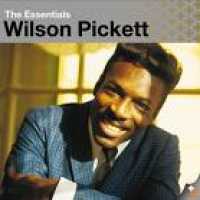Together with Otis Redding and Aretha Franklin, Wilson Pickett was among the most popular and acclaimed soul singers of the 1960s. His gritty rasp and signature scream on classic hits like "Mustang Sally," "Land of 1,000 Dances" and "In the Midnight Hour" helped put the soul meccas of Memphis, Tennessee, and Muscle Shoals, Alabama, on the music map.
Born in Prattville, Alabama, on March 18, 1941, Wilson Pickett was the youngest of eleven children who spent much of their youths picking cotton. Pickett, whose grandfather was a preacher, began his singing career in the church choir. In 1955, he moved to Detroit to live with his father and joined gospel group the Violinaires. Four years later, Pickett jumped into the secular music world when he joined R&B group the Falcons, whose 1962 hit "I Found a Love" (Number Six R&B) helped him land a solo deal with Atlantic Records.
Atlantic executive Jerry Wexler, who signed Pickett in 1964, once said the singer didn't perfect his memorable gritty soul voice until he traveled back down south, to Memphis, where he recorded his first big solo hit, "In the Midnight Hour" (Number One R&B, Number 21 pop, 1965). Wexler nicknamed him The Wicked Pickett after hearing his secretary teasingly tell the singer one day, "Ooooh, you're wicked!" Pickett followed "Midnight Hour" with a string of wild, sexually charged Top Ten hits throughout the Sixties and into the Seventies, including "634-5789 (Soulsville, U.S.A.)" (Number One R&B, Number 13 pop, 1966), "Land Of 1000 Dances" (Number One R&B, Number Six pop, 1966), "Mustang Sally" (Number Six R&B, Number 23 pop, 1966), "Funky Broadway" (Number One R&B, Number Eight pop, 1967), "I Found a Love – Pt. 1" (Number Six R&B, Number 32 pop, 1967), "I'm In Love" (Number Four R&B, Number 45 pop, 1967), "Soul Dance Number Three" (Number Ten R&B, Number 55 pop, 1967), "She's Lookin' Good" (Number Seven R&B, Number 15 pop, 1968), "Engine Number 9" (Number Three R&B, Number 14 pop, 1970), "Don't Knock My Love – Pt. 1" (Number One R&B, Number 13 pop, 1971) and "Don't Let the Green Grass Fool You" (Number Two R&B, Number 17 pop, 1971). He also recorded a famous version of the Beatles' "Hey Jude" (Number 13 R&B, Number 23 pop, 1969) that featured a blistering guitar solo by Duane Allman of the Allman Brothers Band, as well as a cover of Saturday morning cartoon band the Archies' "Sugar Sugar" (Number 25 pop) that transformed the bubblegum song into bluesy soul.
The steam in Pickett's fiery soul ran out in the early Seventies, though he continued recording and performing. During the Eighties and Nineties, he had several run-ins with the law, including charges of carrying a loaded shotgun, assaulting his girlfriend and driving drunk. He also received several honors for his music during that period. In 1991, he was inducted into the Rock and Roll Hall of Fame. In 1993, he received a Pioneer Award from the Rhythm and Blues Foundation. In 1999, he earned a Grammy nomination for the his last studio album It's Harder Now, released on the independent label Bullseye Blues Records. He stopped touring in 2004 due to failing health, and died of a heart attack on January 19, 2006. Little Richard preached and gave the eulogy at Pickett's funeral.
Source: http://www.rollingstone.com/artists/wilsonpickett/biography
